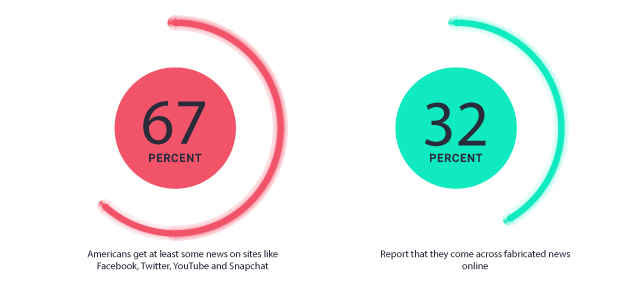Teens, Technology & Tolerance: Is Our Generation Media Literate?

One of the major challenges that our generation experiences is determining whether the content that we come across is real or fake; biased or balanced. According to recent studies, more Americans are getting their news from social media sites, and at least two-thirds of Americans (67%) get at least some news on sites like Facebook, Twitter, YouTube and Snapchat (Grieco, 2017; Bialik & Masta, 2017) About one third (32%) report that they come across fabricated news online (Bialik & Masta, 2017). In another study by Stanford University, findings reveal that students have difficulty distinguishing between advertisements and news sources, and high school students were found to use a photo as “evidence” that a source was valid without investigating the source of the photo (2016). Since advertisements often use propaganda techniques, this insight is noteworthy. You see, advertisements might use propaganda to encourage the sale of a product or service, but propaganda is not used solely to market a business. Propaganda might be used to publicize a particular cause or point-of-view and to influence the audience to think or act in a particular manner.

How does this relate to teens, technology and tolerance?
People that do not exercise critical thinking and medial literacy skills to evaluate the messages that they encounter online are subject to propaganda that may contain misleading information and bias. This is significant because the information that we choose to believe shapes our ideology. An ideology is a system of beliefs or theories held by an individual or a group; a foundation for our decisions. A person’s system of ideas explains or justifies the legitimacy of his or her actions based on social, religious, political views. For example, a person’s ideology determines his or her voting choices during an election. A person’s ideology also guides lifestyle decisions. Although hearing other perspectives can help us learn and grow, some perspectives lead to public safety and homeland security threats. For example, extremist ideologies may justify acts of violence against a specific group of people or acts of terror on society at large. These ideologies stem from intolerance.
In fact, extremist groups are actively using social media to shape teens’ ideologies and recruit them into their militant groups. The media exchanged in these online conversation involves propaganda: media-based messages that have persuaded teens to leave their home and even commit to acts of violence. Investigative reporters uncover the real-life examples of American teens who are targeted for recruitment by extremist groups online. Watch the video.
If we are to protect and cultivate a tolerance in our world, we need to be able to decipher media-based messages and determine whether the information that we come across is real or fake; biased or balanced.
iDrive wants to hear from you!
Want to start your own iDrive campaign or have a topic that you want iDrive to address? Send us a direct message on social media or send an e-mail at advisoryboard@isafeventures.org
Want to contribute social media content to future iDrive campaigns? Submit your application to join the iDrive Student Advisory Board here
Are you reading this article, but you’re not yet an iDrive Agent? Sign up here
Follow iDrive on Facebook, Twitter and Instagram.
Related Stories:
- Featured Article: Teens, Technology & Tolerance
- Teens, Technology & Tolerance: 5 Tips to Cultivate Tolerance Online
- iDrive Agent | Join the Movement: Promote Kindness, Tolerance & Respect Online
- iDrive Student Advisory Board |Take Initiative: Teens, Technology & Tolerance
References:
Advisory: The embedded links may contain potentially offensive material. These links have been selected to provide examples of actual instances involving teens.
Bialik, Kristen, and Katerina Eva Matsa. “Key Trends in Social and Digital News Media.” Pew Research Center, 4 Oct. 2017, www.pewresearch.org/fact-tank/2017/10/04/key-trends-in-social-and-digital-news-media.
CBS Evening News. “At One High School, No One Eats Lunch Alone.” YouTube, YouTube, 10 Mar. 2017, www.youtube.com/watch?v=QdDa2outstI.
“Evaluating Information: The Cornerstone of Civic Online Reasoning.” sheg.stanford.edu/upload/V3LessonPlans/Executive%20Summary%2011.21.16.pdf.
Havens, Emily. “Utah School Investigating after Girls Caught on Video Chanting Racist Slur.” USA Today, Gannett Satellite Information Network, 18 Oct. 2017, www.usatoday.com/story/news/nation-now/2017/10/18/school-igirls-caught-video-chanting-racist-slurs-school-investigating-racist-video-created-teen-girl/776318001.
“Instagram Help Center.” Community Guidelines | Instagram Help Center, help.instagram.com/477434105621119.
Kabc. “Students Post Positive Messages on Lockers Following Classmates’ Suicide.” ABC7 Los Angeles, 9 Sept. 2016, abc7.com/education/students-post-positive-messages-on-lockers-following-classmates-suicide/1505200.
Lenhart, Amanda. “Teens, Social Media & Technology Overview 2015.” Pew Research Center: Internet, Science & Tech, 8 Apr. 2015, www.pewinternet.org/2015/04/09/teens-social-media-technology-2015.
“More Americans Are Turning to Multiple Social Media Sites for News.” Pew Research Center: Internet, Science & Tech, Pew Research Center, 2 Nov. 2017, www.pewresearch.org/fact-tank/2017/11/02/more-americans-are-turning-to-multiple-social-media-sites-for-news.
“National No One Eats Alone Day | A Project of Beyond Differences.” Friday, February 9, 2018 National No One Eats Alone Day, www.nooneeatsalone.org.
“NoHomophobes.com.” NoHomophobes.com, www.nohomophobes.com/#!/today.
Rosen, Rebecca J. “In the Last 3 Months, the Word — Has Been Tweeted 2.6 Million Times.” The Atlantic, Atlantic Media Company, 2 Oct. 2012, www.theatlantic.com/technology/archive/2012/10/in-the-last-3-months-the-word-faggot-has-been-tweeted-26-million-times/263149.
Sawyer, Diane. 20/20 Diane Sawyer Investigates: ISIS in America. ABC. Nov 5, 2017, https://www.youtube.com/watch?v=RZew0rC9tIg
“Tolerance, Understanding, Diversity, Respect, Human Rights, Freedom,
Cooperation between Cultures, Shared Values, Dialogue, Mutual Respect, Conflict, Polarization, Stereotypes, Fear, Hatred, Prejudice.” United Nations, United Nations, www.un.org/en/events/toleranceday/background.shtml.
“USA Kindness Organisations.” The World Kindness Movement, www.theworldkindnessmovement.org/member_nation/global-classroom-connection.
The World Kindness Movement. www.theworldkindnessmovement.org.













